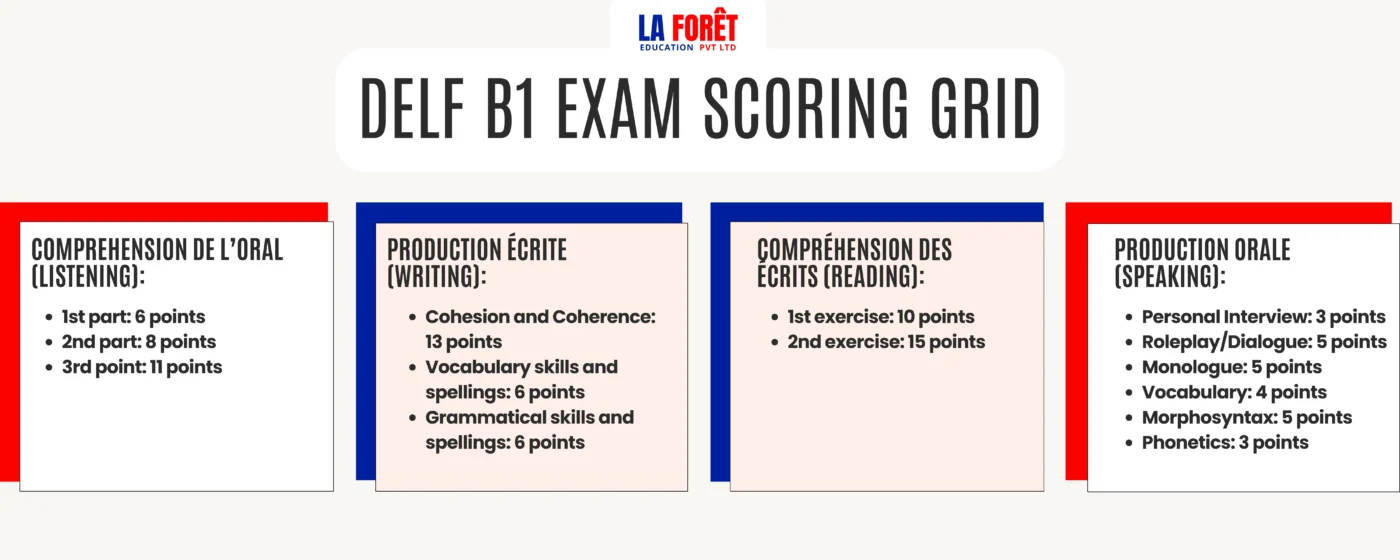This article provides a comprehensive guide to preparing for the DELF B1 exam. It also covers the exam structure, scoring grid, common topics, and tips for effective preparation.
Additionally, we have included information on how to overcome exam anxiety and find the best resources for studying for the DELF B1 exam. So, are you ready to dive in?

The Diplôme d’Études en Langue Française (DELF) B1 exam is an internationally recognized French language exam designed for intermediate-level learners. This examination assesses your ability to communicate effectively in various real-life situations.
The advantages of achieving the DELF B1 exam are aplenty.
Not only does it validate your French language skills, but it also opens doors to education and employment opportunities in Francophone countries.
Whether you’re planning to study at a French university, work abroad, or simply enhance your linguistic prowess, B1-level French is a valuable asset.
Particularly noteworthy is that obtaining DELF B1 is a requirement for acquiring citizenship in France and Switzerland, making it an essential step for those aspiring to call these countries home.
DELF B1 Exam Structure
The DELF B1 exam assesses your French language skills in four main parts:
- Comprehension de l’Oral (Listening),
- Compréhension des Écrits (Reading),
- Production Écrite (Writing), and
- Production Orale (Speaking).
Each of these parts have further subparts and each part has a specific time allotted as well.
Compréhension de l’Orale (Listening):
The French B1 listening comprehension test consists of 3 parts total.
Each part is an audio document, following which questions are to be answered.
The documents are played two times each.
The first audio document is always a daily conversation. It is usually 30 seconds to 1 minute long. You get 30 seconds to read the questions before the audio is played. The pausing time between two plays is 30 seconds. Then, you get 1 minute to complete the remaining questions after the second play.
This tests your global comprehension of the French language.
The questions can be MCQ (Multiple Choice Questions) or/and open-ended questions (requiring short answers in a few words).
The second and the third audio documents are a bit longer than the first and are radio broadcasts (for example, interviews).
This tests your detailed comprehension of the French language. The questions are also more detailed in number.
The second audio is usually 2 to 3 minutes long. You get 30 seconds to read the questions. The pausing time between two plays is 30 seconds. You get 1 minute to complete after the second play.
The third audio document is usually 2 to 3 minutes long. You get 1 minute to read the questions.The pausing time between two plays is 3 minutes. You get 2 minutes to complete after the second play.
Compréhension des Écrits (Reading):
The B1 French reading comprehension includes 2 parts in total. The total time is 35 mins.
The first exercise tests your capacity to locate and select information that serves the task given. It consists of 4 to 5 texts of about 60 to 80 words with a table to complete.
The texts are in the personal or professional domain, like leisure, family, work, and more. You should be completing this exercise within 10 minutes.
The second exercise tests your capacity to understand the information, ideas, and opinions in an original text. The text is generally about 400 to 500 texts, and the questions asked are of different levels of understanding.
You should be completing this exercise within the remaining 25 minutes.
Production Écrite (Writing):
In the Delf B1 writing test, you will be asked about your opinion on a relevant topic in the education or professional realm. You have to produce one single, coherent text of about 180 words. The total time is 45 minutes.
This tests your capacity to describe and present facts, express your feelings, and describe your emotions. The task given could be an essay, a letter, or an article.
Production Orale (Speaking):
In this French B1 level test, there are 3 parts in total.
- Personal Interview (2-3 minutes): The examiner aims to understand you better by asking about your preferences, habits, hobbies, and the people or things in your life. Expect questions that delve into your likes, dislikes, and personal experiences.
- Roleplay/Dialogue (3-4 minutes): Engage in a conversation with the examiner based on a given daily life scenario, either formal or informal. This task requires you to discuss, problem-solve, or persuade without any prior preparation. The situation presented will test your ability to communicate spontaneously.
- Expressing a Point of View (5-7 minutes): This task involves delivering a monologue where you express your perspective on a given topic. You will have 10 minutes to prepare before presenting your views. After concluding your monologue, the examiner may pose 2-3 questions related to the discussion. It’s advisable to limit the examiner’s input during the monologue, as it primarily focuses on your ability to express your thoughts.
DELF B1 Exam Scoring Grid

DELF B1 Topics Asked
| Grammar: | Vocabulary: | Communication skills |
| Agreement of Past Participles | Everyday Life Vocabulary: transportation, travel, leisure activities | Descriptive Skill: People, Places, Objects, Facts |
| Past Perfect Tense (Le Plus-que-parfait) | Describing Physical Appearance | Temporal References: Locating in Time |
| Indirect Speech (Present and Past Tense) | Clothing Terminology | Spatial References: Locating in Space |
| Sequence of Tenses (La Concordance des Temps) | Expressing Emotions | Expressing Feelings and Opinions (Positive or Negative) |
| The Subjunctive (Possibility & Obligation) | Events: Meeting Someone, Unplanned Occurrences | Discussing the Past |
| The Passive and Active Voice | Work Environment: Companies, Jobs, Colleagues | Exploring the Future |
| The Gerund (Le Gérondif) | Media: Newspapers, Simple Articles on Daily Life | Argumentation Techniques: Supporting and Proving a Point |
| Double Pronouns | – | – |
| Possessive Pronouns | – | – |
| Demonstrative Pronouns | – | – |
| Prepositions and Adverbs of Time | – | – |
| Prepositions and Adverbs of Place | – | – |
| Logical Connectors for Chronology | – | – |
| Logical Connectors for Consequence | – | – |
| Conjunction “POUR QUE” + Subjunctive | – | – |
How do you Prepare for the DELF B1 Exam?
Focus on weak skills:
Identify and concentrate on areas where you face challenges. If, for instance, listening comprehension proves difficult, allocate extra study time to this skill. Improving consistently in your weaker sections significantly contributes to your overall success.
Immersion in the language:
Immerse yourself in the French language by engaging with movies, shows, songs, and language-learning apps. This not only enhances language skills but also exposes you to colloquial expressions and cultural nuances, making your language usage more authentic.
For more information on language-learning apps, you can explore the details provided here: The 5 Best Apps for Learning French.
Solving Sample Papers:
Familiarize yourself with the exam environment by solving DELF B1 sample papers. This practice not only builds your confidence but also helps identify areas that may require additional attention. It provides a simulated experience, preparing you for the actual examination conditions.
Joining Classes:
Consider enrolling in French language classes for structured guidance. Experienced instructors offer valuable insights, provide personalized feedback, and create a supportive learning environment. Joining classes can provide a systematic and comprehensive approach to mastering the language, helping you navigate the challenges effectively.
Join us for classes: https://www.frenchclass.in/
How much time do you need to prepare for the DELF B1 exam?
The estimated preparation time of 80-85 hours for the DELF B1 exam is a general guideline and can vary depending on individual factors such as prior language proficiency, familiarity with French, and personal study habits.
Tailor your study plan to your specific needs and adapt as you progress through your preparation.
What Resources do I Follow?
- Réussir DELF B1 Book: The Réussir DELF B1 book is a dedicated resource designed specifically for success in the DELF B1 exam. This book likely provides comprehensive coverage of the exam content, including practice exercises, sample papers, and detailed explanations of grammar and vocabulary relevant to the B1 level.
- Cosmopolite 3 Textbook: Cosmopolite 3 is a French language textbook that could be used to reinforce language skills necessary for the DELF B1 exam. This series often covers a range of topics, grammar structures, and vocabulary that align with the B1 level, making it a valuable resource for overall language development.
- Online Resources: Explore various online tools for efficient DELF B1 preparation. Access the official sample papers to familiarize yourself with the exam format. Stay updated on current events through French news websites, enhancing your reading skills. Engage with online forums for shared insights and additional resources, creating a well-rounded study approach.
How to Overcome Exam Anxiety for DELF B1?
- Practice Relaxation Techniques:
Incorporate relaxation techniques into your study routine to manage exam anxiety. Techniques such as deep breathing, progressive muscle relaxation, or mindfulness can help calm your nerves. Practice these regularly to build a sense of control over stress and create a focused mindset for the DELF B1 exam.
- Positive Self-Talk:
Challenge negative thoughts and replace them with positive affirmations. Remind yourself of your preparation efforts and past achievements. Positive self-talk can boost confidence and shift your mindset from anxiety to a more optimistic and empowered state, fostering a positive attitude towards the exam.
- Warm-up Your Brain:
Prior to the exam, engage in activities that stimulate your brain and enhance focus. Solve a few language-related puzzles, review vocabulary, or do a quick language exercise. This warm-up routine helps activate your cognitive functions and builds mental readiness for the challenges of the DELF B1 test, reducing pre-exam jitters.
I hope all of you are ready with your stopwatch in your hand 🙂





